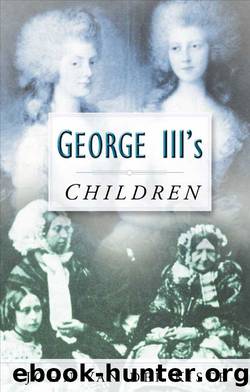George III's Children by John Van der Kiste

Author:John Van der Kiste [Kiste, John Van der]
Language: eng
Format: epub
Tags: history, World
ISBN: 9780750953825
Google: yiwTDQAAQBAJ
Publisher: The History Press
Published: 2004-01-19T00:14:52.183523+00:00
Since his recall from Gibraltar, the Duke of Kent had been kept professionally unemployed. Bitterly jealous that the Duke of York had been reappointed Commander-in-Chief but that there was no similar reinstatement of office for him, he never forgave the Regent. However, not one to remain idle for long, he kept himself occupied with his charity work, chairing meetings for the benefit of widows, orphans, and the under-privileged. He was a close friend and admirer of the pioneer socialist Robert Owen, and chaired meetings promoting Owenâs plans to establish âexperimental villages of co-operation.â Apart from the Duke of Sussex, he was the only son of King George III to embrace liberal principles with enthusiasm, and he was always keen to assist those less fortunate than himself. Unlike his father, he sympathized with the movement for Catholic emancipation, partly because of his friendship with Madame, partly as he saw no reason why followers of another religion should be so penalized. Yet in the name of family solidarity, he told the Regent that he would personally vote against emancipation in the House of Lords if required to do so, in deference to his father, but when his eldest brother (at this time, also a supporter of the Catholics) became King, he would vote in accordance with his principles.
Apart from the Regent, he was regarded as the most intelligent of the Princes. The Duke of Wellington said that he never knew any man who had âmore natural eloquence in conversationâ than the Duke, who was gifted at âchoosing the best topics for each particular person,â and excelling in after-dinner speeches. While his military career had brought out the worst in him, and âhis name was never uttered without a sigh by the functionaries of every public office,â his niece Princess Charlotte was devoted to him, and Mrs Fitzherbert trusted and valued his friendship implicitly.
His abstemious way of life â rising early, eating and drinking sparingly, and frowning on gambling â was praised by some, although regarded with contempt by others. His more self-indulgent brothers called him âJoseph Surfaceâ behind his back.
The Duke and Madame always had a warm welcome at Castle Hill Lodge for their guests, who were always impressed by the hospitality. None more so than Mr Justice George Hardinge, who was astonished to be shown a closet with a running stream and a fountain playing, and to see that the lawn, covered in autumn leaves one morning, was cleared to the last leaf and twig by a gardener and six assistants within fifteen minutes. But his greatest amazement of all was reserved for breakfast, when he saw the Duke get up and speak in German to someone behind a glass door in the dining room. As the judge was lifting a cup of tea to his lips, an invisible thirty-strong orchestra broke into a lament written in memory of his nephew, killed in a naval battle three years earlier.
Download
This site does not store any files on its server. We only index and link to content provided by other sites. Please contact the content providers to delete copyright contents if any and email us, we'll remove relevant links or contents immediately.
Machine Learning at Scale with H2O by Gregory Keys | David Whiting(4295)
Never by Ken Follett(3937)
Harry Potter and the Goblet Of Fire by J.K. Rowling(3848)
Unfinished: A Memoir by Priyanka Chopra Jonas(3382)
Fairy Tale by Stephen King(3370)
The Man Who Died Twice by Richard Osman(3072)
Will by Will Smith(2911)
Rationality by Steven Pinker(2352)
It Starts With Us (It Ends with Us #2) by Colleen Hoover(2345)
Can't Hurt Me: Master Your Mind and Defy the Odds - Clean Edition by David Goggins(2324)
The Dark Hours by Michael Connelly(2300)
The Storyteller by Dave Grohl(2229)
Friends, Lovers, and the Big Terrible Thing by Matthew Perry(2219)
The Dawn of Everything: A New History of Humanity by David Graeber & David Wengrow(2197)
The Becoming by Nora Roberts(2189)
The Stranger in the Lifeboat by Mitch Albom(2113)
Cloud Cuckoo Land by Anthony Doerr(2104)
Love on the Brain by Ali Hazelwood(2062)
Einstein: His Life and Universe by Walter Isaacson(2012)
